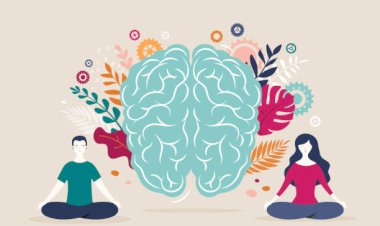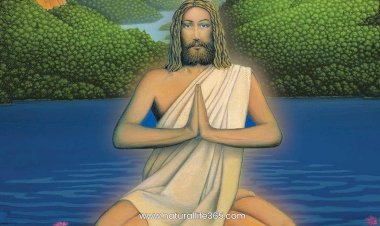Meditation Tips from a Monk: Achieving Inner Peace and Clarity
Achieve inner peace and clarity with meditation tips from a monk. Learn practical mindfulness techniques to enhance your meditation practice.

In today's fast-paced and often chaotic world, finding a moment of peace can feel like a daunting task. With endless distractions and responsibilities, achieving inner peace and clarity is more important than ever. Meditation offers a pathway to calm the mind, nurture the spirit, and cultivate a sense of balance in life.
Who better to guide us on this journey than a monk—someone who has dedicated their life to the practice of meditation and the pursuit of spiritual wisdom? With centuries-old traditions and teachings, monks provide a unique perspective on how to harness the power of meditation to transform our lives.
In this blog, we'll explore practical meditation tips shared by a monk, helping you to develop a meditation practice that brings tranquility and insight into your daily routine. Whether you're a beginner or a seasoned practitioner, these insights will guide you toward achieving the inner peace and clarity you seek.
Understanding Meditation
Meditation is a practice that transcends cultures and religions, offering a way to explore the depths of the mind and spirit. At its core, meditation is about cultivating awareness and attention, enabling individuals to connect with their inner selves and the present moment. While often associated with relaxation and stress relief, meditation's benefits extend far beyond these, encompassing mental clarity, emotional balance, and spiritual growth.
Historically, meditation has played a crucial role in various monastic traditions, from Buddhism to Hinduism and beyond. Monks, who dedicate their lives to spiritual exploration, have long embraced meditation as a means of achieving enlightenment and inner peace. Their teachings highlight the transformative power of meditation in understanding the nature of the mind and the universe.
Meditation practices are diverse, ranging from mindfulness meditation, which focuses on being present in the moment, to transcendental meditation, which involves repeating a mantra to quiet the mind. Other forms, like loving-kindness meditation, emphasize compassion and empathy, while body scan meditation encourages awareness of physical sensations.
At the heart of all these practices is the goal of achieving mental clarity. By turning inward and observing thoughts and feelings without judgment, meditation helps to quiet the mind's chatter, reduce anxiety, and enhance focus. Over time, regular meditation practice can lead to profound insights and a deeper understanding of oneself and the world.
Embracing meditation as a daily practice can unlock the door to a more peaceful and centered existence, guiding individuals on their journey to inner peace and clarity.
You can also read The Mind and Its Control
Tips from a Monk for Effective Meditation
Embarking on a meditation journey can be transformative, and insights from a monk can provide invaluable guidance. Here are some tips from a monk to help you establish and deepen your meditation practice:
1. Create a Sacred Space
Establishing a dedicated space for meditation can greatly enhance your practice. Find a quiet corner in your home where you feel comfortable and at ease. Decorate it with calming elements such as candles, incense, or a small altar to create an environment that invites tranquility and focus. This space should be a retreat from daily distractions, offering a sanctuary for reflection and mindfulness.
2. Establish a Routine
Consistency is key to reaping the benefits of meditation. Set aside a specific time each day to meditate, whether in the morning to set a peaceful tone for the day or in the evening to unwind. Developing a routine helps train your mind to enter a meditative state more easily, reinforcing the habit and making meditation an integral part of your life.
3. Start with Breathing Exercises
Breathing is the foundation of meditation, providing an anchor for the mind. Begin each session with simple breathing exercises, focusing on the natural rhythm of your breath. Inhale deeply through your nose, hold for a moment, and exhale slowly through your mouth. This practice not only calms the mind but also prepares your body for deeper meditation.
4. Practice Mindfulness
Mindfulness involves being fully present and aware of each moment. During meditation, observe your thoughts and feelings without judgment or attachment. If your mind starts to wander, gently bring your focus back to your breath or a chosen point of concentration. Over time, mindfulness will permeate your daily activities, helping you approach life with greater clarity and calmness.
5. Use Guided Meditations
For beginners or those seeking variety, guided meditations can be immensely helpful. They provide structured sessions led by experienced practitioners, guiding you through various techniques and themes. Many apps and online resources offer a range of guided meditations, from short daily sessions to longer explorations of specific topics.
6. Embrace Silence and Stillness
Silence is a powerful tool in meditation, allowing you to listen to your inner voice and connect with your true self. Embrace moments of silence, even if they feel uncomfortable at first. Allow yourself to sit in stillness, observing the ebb and flow of thoughts without interference. This practice deepens your awareness and fosters a profound sense of peace.
7. Be Patient and Compassionate with Yourself
Meditation is a journey, and like any journey, it requires patience and self-compassion. There will be days when your mind is restless or distracted, and that's perfectly okay. Instead of striving for perfection, focus on the process and progress. Celebrate small victories and approach your practice with kindness, acknowledging that each session contributes to your growth.
Overcoming Common Meditation Challenges
Meditation can be a deeply rewarding practice, but it often comes with its own set of challenges. Whether you're new to meditation or a seasoned practitioner, overcoming these hurdles is key to maintaining a consistent and fulfilling practice. Here are some common meditation challenges and strategies to address them:
1. Restlessness and Inability to Focus
It's natural for the mind to wander during meditation, especially when starting out. To combat restlessness, begin each session with a few minutes of deep breathing to calm the mind. If you find your thoughts drifting, gently redirect your attention back to your breath or a chosen point of focus. Practicing mindfulness in everyday activities can also improve concentration during meditation.
2. Lack of Time
In our busy lives, finding time for meditation can seem daunting. Start by dedicating just a few minutes each day to your practice, gradually increasing the duration as it becomes a regular part of your routine. Remember, even short sessions can be effective. Consider integrating meditation into your existing schedule by using moments of waiting or downtime to practice mindfulness.
3. Physical Discomfort
Sitting for extended periods can lead to physical discomfort or restlessness. To alleviate this, experiment with different meditation postures and props. Use cushions, chairs, or benches to support your body and maintain a comfortable position. Regularly practicing yoga or stretching can also enhance your flexibility and comfort during meditation.
4. Frustration with Progress
It's common to feel frustrated when progress seems slow or inconsistent. Meditation is a journey that unfolds over time, and each session is an opportunity for growth. Focus on the process rather than the outcome, and celebrate small milestones along the way. Cultivate a mindset of patience and acceptance, recognizing that every meditation experience contributes to your overall development.
5. Dealing with Negative Emotions
Meditation can bring buried emotions to the surface, which may be challenging to face. When this happens, approach these emotions with curiosity and compassion, observing them without judgment. Allow yourself to fully experience and process these feelings, using meditation as a safe space for self-exploration and healing.
6. Staying Motivated
Maintaining motivation can be challenging, especially when faced with distractions or setbacks. Set realistic goals for your meditation practice, and remind yourself of the benefits and positive changes you've experienced. Consider joining a meditation group or finding a meditation buddy to share experiences and support each other on the journey.
You can also read The Power of Positivity Thinking: Swami Vivekananda’s Lessons for a Fulfilling Life
Real-Life Benefits of Meditation
Meditation is more than just a practice; it’s a transformative journey that offers profound benefits for both the mind and body. Incorporating meditation into your daily routine can lead to significant improvements in various aspects of your life. Here are some real-life benefits of meditation that you can experience:
1. Reduced Stress and Anxiety
Meditation helps calm the mind and body, reducing the stress hormone cortisol. Regular practice can lower anxiety levels, providing a sense of peace and relaxation that carries into daily life. By learning to observe thoughts without judgment, you develop resilience against stressors and cultivate a more balanced emotional state.
2. Improved Focus and Concentration
Meditation trains the mind to focus on the present moment, enhancing concentration and cognitive function. Studies have shown that meditation can increase attention span and improve memory retention, making it easier to stay focused on tasks and absorb new information.
3. Enhanced Emotional Well-being
Meditation fosters emotional awareness and self-regulation, helping you manage negative emotions more effectively. By cultivating mindfulness and compassion, you can improve your emotional intelligence and strengthen relationships. Meditation also promotes feelings of happiness and contentment, contributing to overall well-being.
4. Better Sleep Quality
Meditation can improve sleep quality by calming the mind and relaxing the body. Techniques such as mindfulness meditation and progressive muscle relaxation help release tension and reduce insomnia symptoms. A regular meditation practice can lead to more restful and restorative sleep, leaving you refreshed and energized.
5. Increased Self-Awareness
Meditation encourages introspection and self-discovery, allowing you to gain a deeper understanding of your thoughts, emotions, and behaviors. This heightened self-awareness can lead to personal growth and positive changes, helping you align your actions with your values and goals.
6. Physical Health Benefits
Beyond mental well-being, meditation offers numerous physical health benefits. It can lower blood pressure, improve heart health, and boost the immune system. Regular meditation has also been linked to reduced pain perception and improved management of chronic conditions.
7. Spiritual Growth and Connection
For many, meditation is a spiritual journey that fosters a sense of connection with oneself and the universe. It provides an opportunity to explore spiritual beliefs and practices, deepening your understanding of your place in the world and nurturing a sense of inner peace and harmony.
The benefits of meditation are both tangible and profound, offering a pathway to a more fulfilling and balanced life. By integrating meditation into your daily routine, you can experience these real-life transformations and unlock the potential for greater peace and clarity.
Renowned Monks for Their Teachings on Meditation and Mindfulness
- Thich Nhat Hanh: A Vietnamese Zen master and peace activist known for his teachings on mindfulness, compassion, and living in the present moment.
- Dalai Lama: The spiritual leader of Tibetan Buddhism, the Dalai Lama often speaks about the importance of compassion, meditation, and emotional well-being.
- Ajahn Brahm: A British Theravada Buddhist monk known for his teachings on meditation, mindfulness, and developing a peaceful mind.
- Pema Chödrön: An American Buddhist nun and author known for her accessible teachings on meditation, mindfulness, and dealing with difficult emotions.
- Yongey Mingyur Rinpoche: A Tibetan Buddhist teacher known for his ability to convey complex meditation concepts in simple, relatable terms.
Meditation is a powerful tool for achieving inner peace and clarity, offering profound benefits for both the mind and body. By incorporating the timeless wisdom and practical tips shared by monks into your daily routine, you can embark on a transformative journey toward a more mindful and balanced life.
Ready to experience the power of meditation for yourself? Start today by setting aside just a few minutes to practice, and gradually build your way to deeper sessions. As you continue, you'll find that the peace and clarity you seek are within your reach. Embrace the journey and unlock the true potential of your mind.
If you value these free online resources provided by Natural Life 365, please consider supporting my website by sharing the blogs ![]()
DISCLAIMER:
Some of the links in this content may be affiliate links. This means that if you click on one of the links and make a purchase, I may receive a commission (at no extra charge to you). However, I only recommend products that I personally use and have tested myself. Also, understand that I have taken reasonable steps to ensure that the information on this content is accurate, but I cannot represent that the website(s) mentioned in this post are free from errors. Please, check the Affiliate Disclosure at the bottom of this website.








































